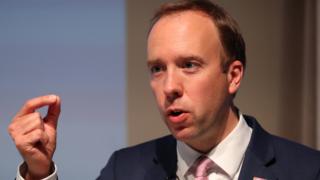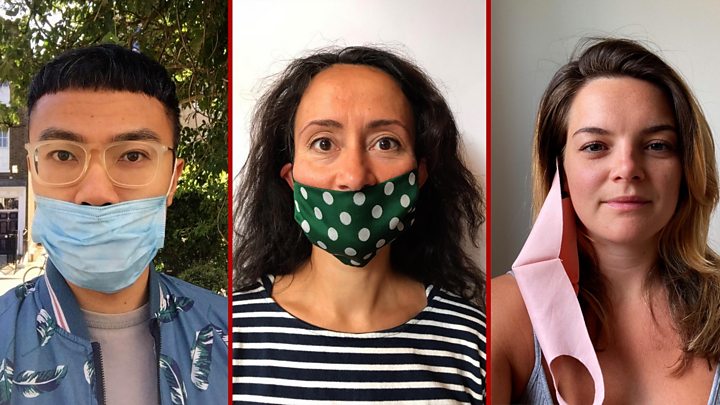
Image copyright
PA Media
Matt Hancock said evidence suggests transmission at workplaces is low
The UK government is not considering making the wearing of face masks compulsory in offices and workplaces, Health Secretary Matt Hancock has said.
It comes as France ruled that coverings must be worn in most workplaces following a surge in coronavirus cases.
“We constantly look at the scientific advice and the answer here is that we are not currently considering doing that,” said Mr Hancock.
Face coverings are currently required in some indoor settings in the UK.
For example, they are compulsory for customers in shops in England, Scotland and Northern Ireland – but not for staff.
They are also required for anyone travelling on public transport anywhere in the UK.
Earlier this week, France announced that from 1 September masks would be compulsory in all shared spaces in offices and factories where there is more than one worker present.
Image copyright
Getty Images
Previously, the French government only advised wearing masks at work when distancing is not possible
Masks are also compulsory in some busy outdoor areas in Paris and other French cities.
Asked on BBC Breakfast whether the UK would follow France and introduce masks in workplaces, Mr Hancock said it was not being considered.
“And the reason is that the evidence from NHS Test and Trace for where people catch the disease is that, very largely, they catch it from one household meeting another household, usually in one of their homes.
“And so it’s that household transmission that is the core root of passing on this virus in this country.
“The amount of people who have caught it in workplaces is relatively low, we think, from the evidence we’ve got.”
It comes as the government announced on Wednesday that a further 16 people had died with the virus, taking the UK’s total to 41,397.
These are deaths for any reason within 28 days of a positive coronavirus test.
There is currently no universal rule for workers to wear face masks at work in the UK. However, the government has set out guidance for particular industries.
For example, hairdressers and beauticians are advised to cover their faces because it’s harder to socially distance with the public.
Staff that work in shops or other indoor settings do not have to wear face coverings – although the government suggests businesses “consider their use where appropriate”.
From the start of August, the government changed its guidance about work, no longer ordering people to work from home where they can.
It is now up to employers to decide whether staff can return to the workplace – as long as it is safe to do so.
Previous restrictions on the use of public transport in England have also been removed, meaning anyone can now use it.

Media playback is unsupported on your device
Over the past few months, there have been outbreaks among workers at meat processing plants as well as factories.
Most recently, there has been an outbreak at a factory in Newark, Nottinghamshire, which makes desserts for Waitrose and Tesco.
In other coronavirus developments:
- Heathrow Airport is planning to offer coronavirus tests so that passengers returning to the UK from some countries would not have to spend the full 14 days in quarantine if they test negative. The plan needs government approval but, if rolled out, travellers would be tested at the airport and then again at home a few days later. If they pass both tests they will be able to stop quarantining. Mr Hancock told LBC the government was working with Heathrow on the plan but it must be made “safe and secure”
- A survey that tests people in the UK is to be expanded, to get a better idea of how many are infected at any one time. The aim is to test 150,000 people a fortnight in England by October, up from 28,000 now
- Mr Hancock revealed the government is “absolutely looking at” lifting the cap on the number of places to study medicine, after fears there will not be enough places for all the students with the grades to get in
- European researchers have said the loss of smell that can accompany coronavirus is unique and different from that experienced by someone with a bad cold or flu

















